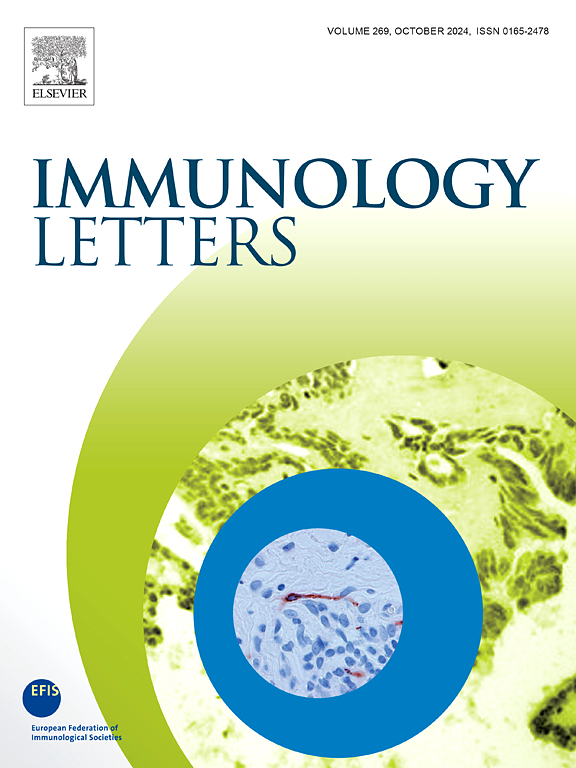趋化因子受体-配体相互作用和DC-NK串扰中共刺激分子的改变:一种治疗寻常型天疱疮的新方法。
IF 2.8
4区 医学
Q3 IMMUNOLOGY
引用次数: 0
摘要
先天免疫细胞,特别是自然杀伤细胞(NK)和树突状细胞(dc),在天疱疮(PV)的免疫发病机制中起着至关重要的作用,这是一种自身免疫性起泡疾病。这些先天细胞的失调可导致适应性免疫反应的显著后果,促进疾病进展。本研究探讨了NK细胞和dc之间的串扰作为PV的潜在治疗靶点。我们的研究结果显示PV患者外周血中dc (mDCs和pDCs)和NK细胞(CD56dim和CD56bright)的频率增加。NK细胞表现出颗粒酶活性和IFNγ产生的升高,而dc细胞表现出增强的吞噬能力。在体外,我们观察到dc中可能相互作用的共刺激标记物(CD40和CD80)和趋化因子(CXCL10和CXCL8) mRNA表达上调,同时NK细胞上相应受体(CD40L、CD80L、CXCR3和CXCR1)表达增加。PV患者的病变组织也表现出这些受体-配体对的高表达。共培养实验进一步表明,NK细胞颗粒酶活性增加,dc细胞吞噬能力增强,然而,阻断CXCR3导致颗粒酶活性降低,表明它们通过相互作用进行功能调节。这些发现强调了NK-DC串扰在PV发病机制中的重要作用,并表明靶向这种相互作用可能提供一种新的治疗策略来调节PV的免疫反应,为更有效的治疗方法提供了潜力。本文章由计算机程序翻译,如有差异,请以英文原文为准。
Alterations in chemokine receptor-ligand interactions and costimulatory molecules in DC-NK crosstalk: A novel therapeutic approach for pemphigus vulgaris
Innate immune cells, particularly natural killer (NK) cells and dendritic cells (DCs), play a crucial role in the immunopathogenesis of Pemphigus Vulgaris (PV), an autoimmune blistering disorder. Dysregulation of these innate cells can lead to significant consequences in the adaptive immune response, contributing to disease progression. This study investigates the crosstalk between NK cells and DCs as a potential therapeutic target for PV. Our findings reveal an increased frequency of DCs (mDCs and pDCs) and NK cells (CD56dim and CD56bright) in the peripheral circulation of PV patients. NK cells exhibited elevated granzyme activity and IFNγ production, while DCs displayed enhanced phagocytic capabilities. In vitro, we observed upregulated mRNA expression of potentially interacting co-stimulatory markers (CD40 and CD80) and chemokines (CXCL10 and CXCL8) in DCs, alongside increased expression of their corresponding receptors (CD40L, CD80L, CXCR3, and CXCR1) on NK cells. Lesional tissues from PV patients also showed heightened expression of these receptor-ligand pairs. Co-culture experiments further demonstrated increased granzyme activity in NK cells and enhanced phagocytosis in DCs, however, blocking of CXCR3 resulted in decreased granzyme activity, suggesting a functional modulation through their interaction. These findings highlight the significant role of NK-DC crosstalk in PV pathogenesis and suggest that targeting this interaction could offer a novel therapeutic strategy to modulate immune responses in PV, offering the potential for more effective treatment approaches.
求助全文
通过发布文献求助,成功后即可免费获取论文全文。
去求助
来源期刊

Immunology letters
医学-免疫学
CiteScore
7.60
自引率
0.00%
发文量
86
审稿时长
44 days
期刊介绍:
Immunology Letters provides a vehicle for the speedy publication of experimental papers, (mini)Reviews and Letters to the Editor addressing all aspects of molecular and cellular immunology. The essential criteria for publication will be clarity, experimental soundness and novelty. Results contradictory to current accepted thinking or ideas divergent from actual dogmas will be considered for publication provided that they are based on solid experimental findings.
Preference will be given to papers of immediate importance to other investigators, either by their experimental data, new ideas or new methodology. Scientific correspondence to the Editor-in-Chief related to the published papers may also be accepted provided that they are short and scientifically relevant to the papers mentioned, in order to provide a continuing forum for discussion.
 求助内容:
求助内容: 应助结果提醒方式:
应助结果提醒方式:


